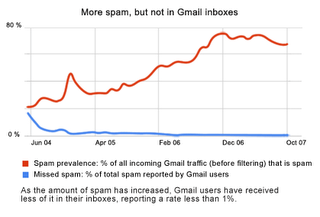Spam: A problem that Google wants to tackle for the enterprise

Back in November, a major supplier of the world's online junk mail (called the McColo network) was taken down - and almost overnight, the Spam trackers at Google reported a 70 percent drop in Spam. But that hardly meant the Internet's Spam problem was gone.
Spammers have been working hard to get their numbers back up to pre-McColo levels, expanding beyond get-rich-quick scams and Viagra offers to include spoofs of what otherwise might be mistakes for legitimate e-mails - things like package-tracking notifications and news alerts with virus-laced links.
Also see: Dancho Danchev: With or without McColo, spam volume increasing again Richard Koman: After McColo, spam way down - temporarily
When it comes to Spam, nothing is predictable. The amount of Spam that comes in fluctuates. The type of Spam that comes in varies. And the damage it might do to a PC or even an entire network is pretty much an unknown. Today, it's Rolex watch offers and links from someone pretending to be FedEx. Who knows what it will be tomorrow?
If you're running an IT department and trying to tackle the Spam problem on your own, that means you're forced to plan for the "what-ifs" of the future. The folks at Google's Message Security Team think that's a problem you should be outsourcing to them. More than a year ago, Google acquired Postini, a company that specialized in Spam filtering, and last month, the company posted a year-in-review look at Spam on its Google Enterprise Blog.
Under Google, Postini has continued to flourish under the Google umbrella, developing a range of products to secure enterprise e-mail. The offerings including some useful tools for the enterprise, such as archiving and e-discovery for e-mails that need to be saved for legal or regulatory reasons.
For some time, I've been hearing about companies that resist switching to Google for corporate mail, usually because of the "security issues" with Web-based mail. But Google makes some strong arguments (and has produced an informative video) for switching to a cloud-based e-mail system. With an outsourced cloud e-mail system, there is no hardware to manage, no patches to download and install and no concerns about employees working on different operating systems, different browsers or even different mobile devices. (Want to know if a switch to cloud e-mail security will save you money? Check out the Google calculator.)
I can't speak first-hand for what Google can do for enterprise e-mail, but I do know that the spam filter on my personal Gmail account rarely lets a get-rick-quick pitch or an offer for Viagra into my inbox. All of those land - as they should - in the Spam folder.
